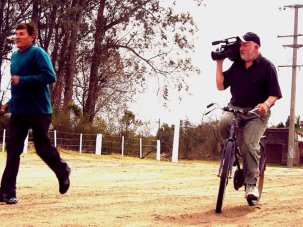Web exclusive

Masterplan
For five years Sergio Wolf has proved to be a safe pair of hands as artistic director of BAFICI, the Buenos Aires Festival Internacional de Cine Independiente. After the curtailed tenures of the vast majority of his predecessors, he has ushered in an era of greater stability, professionalism and internationalism.
The results were already evident at his first festival in 2008, where attendance rose to 222,000, up 2,000 on the previous year. He has steadily built on this, reaching this year an audience of 350,000 – up 15 per cent on 2011. And while the international competition remains a prominent part of the festival – Miguel Gomes, the 2009 Best Film prizewinner, was part of this year’s jury – it remains Argentine cinema for which BAFICI is primarily known.
Throughout the early noughties the festival served as a key dissemination point for a wave of filmmakers emerging from film schools, whose nimble, imaginative features captured the zeitgeist of a society hurtling towards economic meltdown. Its first wave of filmmakers are now established figures on the international festival circuit, but they are still present on BAFICI’s juries, industry panels and, notably, across the special screenings that are scattered throughout the 12-day festival. Indeed, BAFICI remains the place where aspiring homegrown filmmakers want to screen their debut features, including as it does a designated Argentine competitive section and a local presence in both the International and Cinema of the Future competitions.
This year BAFICI was bigger than ever before, with Argentine titles making up 111 of the 449 films screened. However, in the wake of Cannes’ Artistic Director Thierry Frémaux’s telling use of the word ‘suicide’ to describe New Argentine Cinema’s failure to deliver on its early promise, there were rumblings as to whether a more selective curatorial approach might not ultimately serve as a better platform for contemporary Argentine cinema, instead of the current inclusive programming strategy.
The resignation of the enterprising and charismatic Wolf – the festival’s longest-running artistic director – gives the incoming director, critic and editor Marcelo Panozzo, whose appointment was announced on 10 May, the opportunity to consider how the festival functions within the wider context of the country’s cultural ecology, at a time when the common consensus seems to be that Argentina’s alternative theatre circuit, where so many screenwriters and actors now work, seems to have stolen BAFICI’s creative thunder.
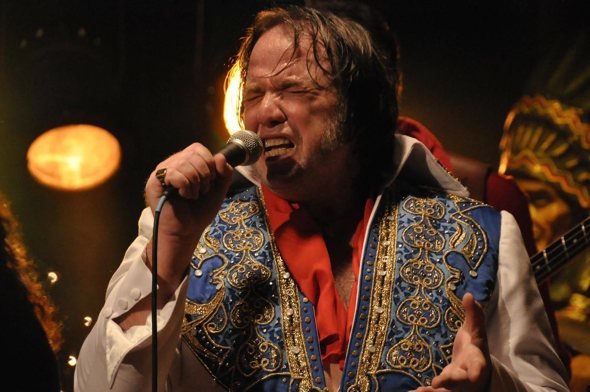
The Last Elvis
It was perhaps not surprising that there was a melancholy mood prevailing at this year’s festival given the national backdrop – President Cristina Fernández de Kirchner’s nationalisation of the country’s largest company, the oil giant YPF, which was sold to the Spanish Repsol in 1993 as part of Carlos Menem’s privatisation of the state’s assets, and imprisoned former dictator Jorge Videla’s admission on record that the Dirty War killed around 7,000-8,000 left-wing activists.
A degree of national soul searching was perceptible in many of the Argentine works premiering at the festival. Coming-of-age films and road movies proved the dominant genres, with journeys taking characters across the length and breadth of the nation, and even beyond it in the case of Armando Bo’s debut feature and the festival’s opening film, El último Elvis (The Last Elvis), first seen at Sundance in January this year.
Bo’s credentials to date are mainly as a commercials director and as a screenwriter – he co-penned González Iñárritu’s Biutiful – but he’s also part of cinematic royalty in Buenos Aires, being the grandson of the legendary B-movie director Armando Bo. Here, working from his own screenplay, he crafts a highly watchable study of an Elvis impersonator who genuinely believes he is The King. He has a fraught relationship with his ex-wife, whom he insists on calling ‘Priscilla’, and a moon-faced daughter – not surprisingly named Lisa-Marie, like his clapped-out Ford LTD car – whose life he flits in and out of. He makes ends meet with a job in a scrap-metal factory that he loathes and gets his kicks from his Elvis act, although he’s not paid regularly for his concerts – one of the film’s many sly comments on the precarious state of the Argentine economy.
John McInerny gives a terrific performance as a man who can no longer distinguish between self and role, with Bo’s camera relentlessly observing his flabby features, greying skin and generally disintegrating physical state. McInerny makes a deft job of the musical numbers, which he thumps out while clad in an array of tight, white, sequined outfits. The film makes some shrewd observations about contemporary society’s obsession with celebrity – there’s a memorable scene in which Elvis greets a number of uncanny impersonators of the likes of Gene Simmons, Britney Spears and John Lennon by their fictional names – while the ending takes this obsession to a gruelling if somewhat implausible conclusion.
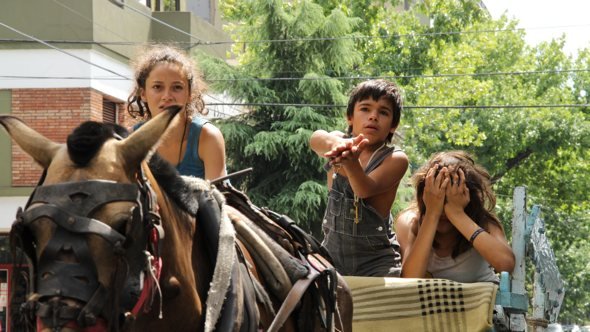
Dromómanos
The consumer dream also came under the scalpel of two very different Argentine films. Luis Ortega’s Dromómanos (Roamers), winner of the Best Director award in the Argentine Official Selection, weaves a story of marginalisation, addiction and salvation through two intersecting narratives, its characters existing on the edge and finding solace in the bottle, drugs and religion. Its fierce rhythm cultivates a poetic register closer to Buñuel than Loach, with a brazen, bow-legged protagonist whose move to reject his crime-ridden past and womanising ways for a future in fire-and-brimstone oratory looks anything but resolute. Enterprise is often the order of the day as desperation sets in – characters are shown resorting to extreme measures in their attempts to uncork a bottle of wine, using an array of implausible instruments that includes a razor blade, a door handle, a pair of scissors and rubber gloves.
Diego and Pablo Levy showed a very different portrait of Buenos Aires as they took on Daniel Burman’s mantle as the chroniclers of the city’s angst-ridden Jewish everyman. Masterplan (pictured at top), a droll black comedy, narrates the predicament of soon-to-be-married Marcelo, who is convinced by his opportunistic future brother-in-law to embark on a fail-safe credit card fraud.
The scheme doesn’t quite go to plan and Marcelo finds the stress is jettisoning his relationship with his wife-to-be (Paula Grinszpan, superb in a role marked by the deadpan performance aesthetic of Martín Rejtman’s work). The film is often very funny, with Alan Sebbagh’s Marcelo finding himself outmanoeuvred in the most banal of circumstances, and proves surprisingly revealing of the insecurities of the thirtysomething male unable to cope with the pressures of domestic commitment.
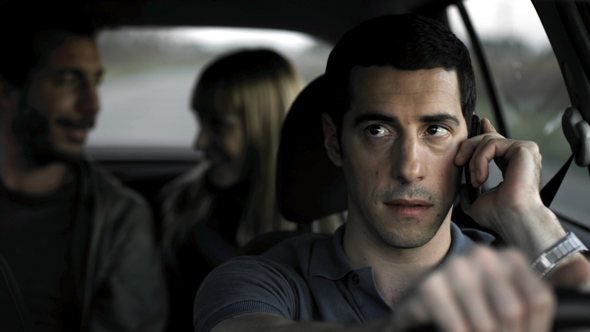
Villegas
Gonzalo Tobal’s Villegas, a Special Screening in Cannes this year, also places Argentine masculinity under the microscope. Here, two of the poster boys for the country’s independent cinema, Esteban Lamothe of El estudiante (The Student) and Esteban Bigliardi of Un mundo misterioso (A Mysterious World), clash in a tale of two cousins who leave Buenos Aires for their hometown of General Villegas to attend their grandfather’s funeral.
This is familiar road-movie terrain: Esteban (Lamothe) is prim and proper, with an office job and an absent fiancée who resents his laid-back cousin; Pipa (Bigliardi) is scruffy, easily led and directionless. As befits the genre, skeletons in the family closet are rattled as the two men embark on a journey of growth and revelation. As in Masterplan, the move from early thirtysomething drifting to the challenges of taking responsibility for family affairs proves to have consequences for both men’s understanding of themselves and their relationship to each other and the wider society in which they operate.
Dysfunctional families were on display in Mariano Luque’s Córdoba-set Salsipuedes, first seen in Berlin Film Festival’s Forum, a disquieting tale of domestic violence that takes place during a couple’s camping trip and sees their marriage unravelling. Meanwhile Maximiliano Schonfeld’s Germania, winner of the International Competition’s Special Jury Award, uses the malaise threatening the livelihood of a close-knit family in a remote German-speaking community in the north-eastern province of Entre Rios to unveil the family’s secrets and lies. If the dialogue and camerawork of Luque evoked Lucrecia Martel’s dissections of bourgeois indulgence, then Schonfeld’s cinematic language intimated a debt to Carlos Reygadas’ Silent Light.

Los salvajes
Cannes’ Critics’ Week provided another outing for Alejandro Fadel’s Los salvajes (The Savages), one of a number of films highlighting adolescent discontent and disorientation that premiered at BAFICI. As one of Pablo Trapero’s regular team of scriptwriters, it was perhaps expected that Fadel’s debut as a sole director – he co-directed El amor – primera parte (Love Part One) in 2003 – would be marked by the pacy drive of Carancho, but instead Fadel opts for an almost Bressonian tone in narrating the adventures of five delinquents who escape from an isolated detention centre in the remote northern province of Misiones.
The film’s pared-down aesthetic, carefully composed frames and minimal dialogue serve to position it as a contemporary western in which the harsh landscape ultimately proves far less hospitable than the correctional facility the errant teenagers have fled. While the thin storyline seems overly laden with symbolic overtones, it also testifies to Fadel’s willingness to use the landscape to evoke mood, ably aided by Carancho cinematographer Julián Apezteguia.
A more middle-class teenage milieu was visible in Diego Prado’s Al cielo (To Heaven), Juanma Brignole’s Mis sucios, tres tonos (My Dirty Three Tones) and Nadir Medina’s El espacio entre los dos (The Space Between Us), each offering a take on the slacker movie and set in different parts of the country. And in Gabriel Medina’s La araña vampiro (The Vampire Spider), a troubled teen suffering anxiety attacks is taken away by his father to a remote country cabin for some quality time, only to be bitten by a poisonous spider on his first night away.
The pre-adolescent protagonists undertake a fishing trip in Armando Gatti’s Arrecifes-set Igual si llueve (Even if it Rains), one of the few films to structure its narrative in largely pictorial terms, while Celina Murga’s Una escuela normal (A Normal School) plunges us into the pulsating rhythm of life in a secondary state school in Paraná (once attended by the filmmaker) that has too many students and too few resources. As with last year’s The Student, the film functions both as a portrait of the intrigues and routines of a community at work and as a metaphoric commentary on the country’s creaky operative structure.
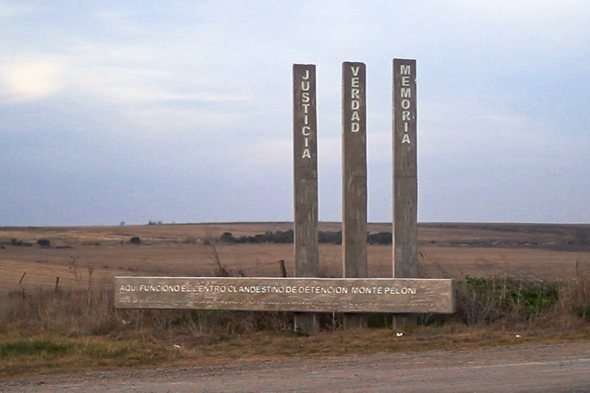
17 monumentos
It is perhaps not surprising that in a year when inflation is running close to 30 per cent and government rhetoric around the sovereignty of the Falklands Islands has intensified, issues of memory, identity and the construction of the self (as a microcosm of a nation state that is built on the immigrant experience) should prove so prevalent in the festival’s Argentine offerings.
In El etnógrafo (The Ethnographer), Ulises Rosell shows the English ethnographer John Palmer championing the causes and rights of the indigenous Wichi community in Salta, where he has made his home. Inés de Oliveira Cézar’s Cassandra charts the journey of a recent graduate trying to complete a journalistic feature on the Wichi and Tobas populations in remote areas of El Chato. Jonathan Perel’s 17 monumentos (17 Monuments; trailer) lingers on 17 ex-torture centres spread across the country, capturing them through a still camera that hovers at a respectful distance to the monuments used to commemorate those who lost their lives in these clandestine centres of violence operated by the 1976-83 dictatorship.
In Gastón Solnicki’s startling Papirosen, winner of Best Film in the Argentine competition, the expert editing of super 8 footage shot in the 1970s, 80s and early 90s by the filmmaker’s family and more recent filmed material by Solnicki explores the wounds left on the clan by the Holocaust and its aftermath. Through suggestion, observation and what goes unsaid, we witness a family for whom materialist consumption has proffered an answer to the void left by the extermination, exile and emigration that has marked Jewish history throughout the 20th century.
2012’s BAFICI may not be remembered as a vintage year for Argentine cinema – its titles lacked the singular edge of last year’s The Student or 2010’s El ambulante (The Peddler) and Lo que más quiero (The Which I Love the Most). Nevertheless, from José Luis García’s commentary on the footage he shot in North Korea in 1989 in La chica del sur (The Girl from the South) to Ivo Aicherbaum’s video diary charting his first visit to see his father in Israel in La parte automática (The Automatic Part), this festival showcased a conspicuous number of films where successive generations of filmmakers appeared to be engaging with their own fractured sense of history, landscape and national identity.




